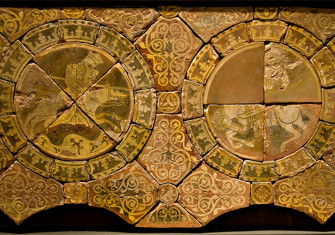Birth of Richard the Lionheart
Richard the Lionheart was born in Oxford on 8 September 1157.

It would have been hard to find a more driving, ambitious and fiercely competitive family to be born into, but Richard would hold his own. He was the third surviving child of Henry II, one of the most astute and formidable of all English kings and the ruler of more of France than the French king himself. Henry’s domains stretched from the Scottish border to the Pyrenees. He was 24 when the new baby was born and Richard’s mother, the ravishingly beautiful, accomplished and wilful Eleanor of Aquitaine, was around 35.
Both of them were French and neither spoke English. Their first son, William, had died in infancy. Their second, Henry, later known as the Young King, was two when Richard was born, and their daughter Matilda was one. There would be two more daughters and two more sons.
Richard was born in Oxford, probably at Beaumont Palace which his grandfather Henry I had built thirty years or so before. There was no university yet at Oxford and the palace stood near where Worcester College is today. Richard was to be his mother’s favourite of her children, but he probably saw little of her or his father as a small child. After his arrival he was handed over to a wet-nurse called Hodierna, who brought him up with her own baby boy, born the same day (he grew up to be the scholar Alexander of Neckam), while Eleanor accompanied her husband on his travels around his realm. Later, when Richard was king, he made sure that Hodierna was well provided for.
As he grew older, Richard saw more of his parents. When he was seven, his mother took him and his sister Matilda to join their father in Normandy and at nine he was in Anjou with his father. He was given a thorough intellectual education and an equally thorough training in the arts of war. A splendid horseman, he would love hunting all his life. He also enjoyed the legend that his family was descended from the Devil, which he used to say explained their behaviour.
Eleanor was determined that Richard should be lord of Aquitaine when the time came. She effectively governed Poitou and Aquitaine from 1168, with Richard at her side, and he learned the trade of ruling from her. At the age of 12 he was invested as Count of Poitou and at 14 as Duke of Aquitaine. He absorbed the troubadour culture of southern France and grew up to write poetry and songs. He loved music and enjoyed conducting the choir in his chapel: he liked them to sing good and loud.
Richard was tall, perhaps 6ft 5in, with red-to-auburn hair and piercing blue eyes. He had a sense of humour and, according to a disapproving clerical chronicler, could keep his companions in fits of laughter. He could be kind, charming and generous, and alternatively ruthlessly cruel, and like all his family he had a fearsome temper. Daring and brave, he would become an inspiring leader of men and one of the best generals of his time.
Fierce family quarrels gave Richard his first experience of war. In 1173 he, the Young King and a younger brother, Geoffrey, backed by their mother, took up arms against their father in a war that lasted eighteen months until Henry II fought them to a standstill and was formally reconciled with his sons. Richard was then just past his 17th birthday. He and his brothers soon began fighting each other, but when he was 25 his situation was changed by the unexpected death of the Young King, of dysentery. Richard was now heir to England. He fought a final war against his father until the latter’s death in 1189 gave Richard the throne of England at the age of 31.
It may have been his mother, who had accompanied the Second Crusade (with immense quantities of luggage), who first implanted in Richard’s mind the idea of being a crusader in what became the obsessive preoccupation of his life. Whether he was called Coeur de Lion before his death in 1199 is uncertain, but contemporaries found the nickname appropriate.






